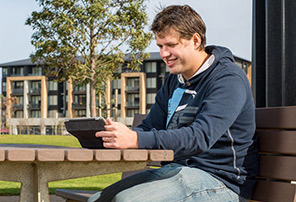You're viewing degree information for Australian students
You're an Australian student if you are any of the following:
- Australian or New Zealand citizen
- Australian Permanent Resident (including Permanent Humanitarian Visa holders)
Please remember your residency (the country you are currently in) has no impact on whether you are an Australian or International student.
Bachelor of Public Health
Degree Level Undergraduate
Year 2025
-
View full entry requirements Hide full entry requirements
Entry requirements
Admission criteria
The admission criteria have been grouped to assist you to easily find the information most relevant to your circumstances. However, you may fit into more than one and the university will consider applicants against each of the relevant criteria.
Certain conditions apply. For more information refer to Appendix 4 of the University's Selection and Entry policy.
Applicants are required to meet one of the following criteria with a competitive result:
Higher education study
Successfully completed equivalent to a minimum of half a year of full-time study of a higher education program at a recognised higher education provider
OR
Vocational Education and Training (VET)
Complete an award from a registered training organisation at Certificate IV or above
OR
Work and life experience (for domestic students only)
Passed a UniSA Online literacy and numeracy test and have relevant work experience, or
Completed a 12-month UniSA Foundation Studies program or equivalent, or
Qualify for Special Entry
OR
Recent secondary education
Completed a secondary education qualification equivalent to SACE, such as an interstate year 12 or international qualification
Essential requirements for admission
Prerequisites
NoneAssumed Knowledge
None
Degree overview
-
Explore diverse areas such as health promotion, health law and ethics, human biology, epidemiology, as well as global, national and Aboriginal health issues.
-
Develop skills in planning, managing and evaluating health care policy, projects, programs and services.
-
Create an industry-standard portfolio of work that you can present to future employers.
-
Learn from academics who come with many years of experience in public health and the health sector.
-
Study course content that has been specifically mapped to align with the Foundation Competencies for Public Health Graduates in Australia.
- Gain a competitive edge with a degree accredited by the International Union for Health Promotion and Education (IUHPE), a global non-government organisation dedicated to health promotion around the world.
Snapshot

Study On Demand – this is a 100% online public health degree designed specifically for online learning. With UniSA Online you can take full control over your study, access support seven days a week, plan your study to fit around your life, view learning resources 24/7, and log into the interactive online environment anywhere, any time and on any device.
This degree goes beyond the treatment of individuals and aims to improve the health and wellbeing of populations. Public health encompasses areas as wide-ranging as chronic disease, the science of aging, mental health, disaster response, refugee health, injury prevention, and tobacco control.
Your course content is informed by current evidence and leading-edge research in the field. Our curriculum has been designed to align with the Australian Public Health Competency Framework to ensure you graduate with highly sought-after knowledge and skills in the industry.
You’ll explore social and environmental factors that lead to illness or poor health in order to prevent disease, prolong life and improve the health and wellbeing of populations and communities. Along with addressing determinants of poor health, you’ll cultivate the skills to promote and maintain health and wellbeing in populations over a person’s lifespan.
Graduates will enter the workforce with the skills to plan, implement, evaluate and monitor public health functions and activities in a variety of settings. Your public health degree opens up a wide range of employment opportunities within grass-roots community agencies, all levels of government, as well as international aid organisations such as the World Health Organisation, UNICEF, UNIAID and the Red Cross.
What you'll learn

Courses within your first year will develop your foundational knowledge in core areas of public health practice. Your second year focuses on applying your knowledge to simulated real-world scenarios and case studies. In your final year, you’ll gain critical employment skills to develop your career as a leading-edge public health practitioner.
Your public health degree applies a multidisciplinary approach, exploring areas such as health promotion, health law and ethics, human biology, epidemiology, as well as Aboriginal, national and global health issues. Throughout your degree, you’ll learn about policy development, data analysis and reporting, media and advocacy, public events, and community-based education and interventions, and how these strategies can be used to improve the health of populations.
Practical, real-world learning is at the heart of your degree. As a student, you’re encouraged to think just as a public health practitioner would. You’ll evaluate current health services, programs or policies and develop recommendations that take into account Australia’s policy environment and political landscape. In your research project, you’ll also use epidemiological data to investigate how the environment impacts health and specific population groups.
Why Bachelor of Public Health

As a public health practitioner, you have the potential to truly make a difference to the world around you. From vaccines that prevent disease, laws that reduce the impacts of tobacco and drug use and prenatal services for babies and parents – the impact of public health is far reaching.
The teaching and learning activities and assessments in your degree have been designed to emulate activities public health practitioners are required to perform in their jobs on a regular basis. Your assessments will contribute to an industry-standard portfolio of work that you can present to future employers.
You’ll be taught by passionate academics and researchers who have decades of experience in public health. We’ve also consulted industry representatives to ensure our course curriculum embeds the skills employers in the public health sector look for.
As a graduate, you’ll meet the six areas of practice outlined in the national competency framework, which has been produced by the Council of Academic Public Health Institutions of Australia (CAPHIA). These competencies are a minimum prerequisite that can be expected of any Australian public health graduate in the industry. These areas include:
-
Health Monitoring and Surveillance
-
Disease Prevention and Control
-
Health Protection
-
Health Promotion
-
Health Policy, Planning and Management
-
Evidence-based Professional Population Health Practice
Your career
Careers in health are on the rise. In fact, the Australian Government’s National Health and Medical Industry Growth Plan is a $1.3 billion investment aimed at driving a new era of better health care, as well as fuelling jobs and growth in new firms and industries through research*.
Public Health practitioners can work in the following areas of public health practice within the health sector in Australia and overseas:
Roles include:
- Public health research officer:
source, analyse and report on research data and information to inform public health policies or health promotion programs; collaborate with other researchers to develop research methods and interview techniques; possess extensive knowledge of local population and health trends; contribute to the delivery of research planning, policy, reporting and quality management processes in an organisation. - Health promotion officer:
plan and develop policies, strategies and projects that promote health at a local, regional or national level; develop the health awareness of individuals, groups and organisations; run community training courses and workshops; write and produce leaflets, posters, videos and brochures to aid health promotion in different environments; and ensure work is underpinned by up-to-date knowledge of health promotion theory. - Epidemiologist / Data analyst:
research, monitor and analyse infectious diseases; collect and analyse health data using a variety of statistical software; educate policy makers, healthcare workers and the community to contain or prevent disease outbreaks. - Wellness and lifestyle coordinator:
design, evaluate and execute lifestyle programs; contribute to the social and emotional life of populations; establish relationships and networks to promote a healthier life. - Community development officer:
deliver innovative programs and community engagement plans; identify and leverage funding opportunities; develop consultation activities; engage with stakeholders to deliver activities aimed at improving community health outcomes. - Women’s health officer:
address the social, political and environmental causes of gender inequities impacting the health and wellbeing of women through research and advocacy for systemic change; deliver training and education programs on women’s health issues and gender awareness; raise awareness of health and wellbeing issues experienced by women. - Aboriginal health officer:
deliver high quality, comprehensive and culturally appropriate primary health care services in urban, regional, rural and remote locations across Australia; develop tailored educational resources and training for community organisations and non-Aboriginal organisations; advocate for culturally respectful and needs-based approaches to improving health and wellbeing outcomes for Aboriginal and Torres Strait Islander people. - Clinical trials coordinator:
conduct and implement clinical trials through site set up, ongoing liaison and data monitoring for quality control, project management and monitoring of participants. - Public health manager:
maintain healthcare standards, manage finances, coordinate treatment programs, and provide an efficient healthcare operation; responsible for human resources within a healthcare system and marketing and promotion of new treatments and healthcare policies to the public.
*Australian Government Department of Health 2018.
Thinking of studying soon?
Industry facts
Enquire now to study with UniSA Online
Control how and when you study with our 100% online degrees.
Your study experience and support
Study On Demand
Our online career-focused degrees give you full control and ultimate flexibility over your study. It’s Study On Demand, on your schedule, on your terms.
- Study 100% online - no need to come onto campus
- Choose from four start dates in January, April, June and September
- Learn in 10-week blocks
- Get support seven days a week - including on weeknights
- Access learning resources 24/7
- View course content before your term starts
- Work while you study
- Plan your study schedule ahead of time
- Fast-track your studies and receive credit for past study and/or work experience.
IT Requirements
As a general rule of thumb, any desktop or laptop computer purchased in the past three years should be capable of meeting your online learning needs. While mobile devices such as tablets and smartphones will be able to access most of your online course content, there are likely to be elements of most courses where we recommend you use a desktop or laptop computer. Your computer should be able to:
- run a modern browser (Microsoft Edge, Firefox 24, Safari 5, or Chrome 32 or later versions)
- run Java
- run programs to create documents, spreadsheets and presentations
- use a web camera and headset (or ear pods with microphone)
- Some UniSA Online degrees require an online exam. The online exam software – Remote Proctor Now – has specific capability requirements. Please refer to the system requirements prior to conducting your exam to ensure your computer is compatible.
Access free IT software and resources
As a UniSA Online student, you'll:
- Get free access to the full Office 365 ProPlus suite, which includes full versions of Word, PowerPoint, Excel, Outlook, OneNote, Publisher, Access and Lync software. Install the full suite on up to five different devices (PC and Mac compatible).
- Get 1Tb of personal storage that syncs with your PC or mobile device through OneDrive - it's like an extra hard drive that allows you to open any of your files from any of your devices, whenever you need them.
- Get free access to LinkedIn Learning - Access more than 5000 video courses on a broad range of topics such as: the Microsoft Office suite, time management and study skills, health and wellbeing, communication and presentation skills, photography, film making and designing your own games or mobile apps.
- Be able to connect with others using Microsoft Teams, Yammer and the Outlook Web App.
There are some degrees that have specialised software requirements. We've made this software available to students to access for free - you'll be able to download and install any of the required programs on your own device anywhere and anytime. See if your degree requires specialised software.
Check your device
Our computer system test will determine if your device has the base system resources and software required to study online. It'll also check the speed of your internet connection.
See if your computer, laptop or device is all set up and ready to go – it takes just a few seconds.
The application process is easy – just follow these simple steps:
-
Check your eligibility
Take our eligibility checker and answer a few short questions to see if you’re eligible. You’ll be given an option to continue your application, save it for later or request a call back from a Degree Adviser if you have any questions. -
Gather your relevant documents
If you're eligible, you'll receive an email outlining the entry requirements and the relevant documentation you need in order to be considered.
In order to verify your academic qualifications, you'll need to upload relevant documents like your official parchment, certificates or transcripts. If you have work experience, you will need to upload your CV as well as any other documents like work references, professional recognition or accreditation or your training certification.
Your email will contain information on the specific documents you need to provide as well as a link to log in to your application. You'll be asked to create an account and set your own password. -
Complete your application and send through your documents
In order to proceed with your conditional offer, you’ll need to complete your application and provide required evidence of your previous study or work experience.
Alternative Pathways
Australian
There are other pathways you can follow to study this degree, including:
- UniSA College Diploma in Health
- UniSA College Undergraduate Certificate in University Studies (Health)
- UniSA Online UniStart
Online Course Facilitator
-
When should I apply?
UniSA Online degrees start four times a year in January, April, June and September. There are key application dates for each term. If you're looking to apply for credit, there are different closing dates you need to be aware of, so it's always best to double check. Key dates can be found at unisaonline.edu.au/key-dates.
-
Do I have to be online at set times?
All of our courses are asynchronous, meaning you choose when to study, whenever it suits you. However, if your degree has online exams, you will need to sit these at a designated date and time. Some courses may also require you to speak to your academics via phone or online communication channels at a mutually agreed time as part of your assessment.
-
What academic support is available?
Our academics are available seven days a week, including weeknights. Throughout your degree, you’ll be supported by our highly experienced academic team of Online Course Facilitators and casual academics. Our teaching team will guide you through your learning and ensure you have an outstanding, high-quality education.
They can help you with your course materials and assessments, provide feedback on your work, assist you with referencing, and can answer any other course-specific queries.
You’ll be able to contact your academics via email, online discussion forums and live messages in the online learning environment. You can also communicate in real-time and chat face-to-face with your academics online.
If you need after-hours learning support, Studiosity is a great resource that can help you with your writing, academic language, grammar and referencing. You’ll also be able to chat online with a Studiosity online adviser.
-
How is my degree structured?
Full-time students study two courses each term. It makes earning a degree completely achievable, especially if you’re working. Your degree is delivered over four terms each year. Each term runs for ten weeks with two-week breaks in between each term.
You’ll also have the option to go part-time, or switch between the two. If you need to take a break in your study, that’s an option too. We recommend speaking to your Student Adviser who can help you update your study plan and check when your courses are offered.
-
What career prospects do I have with my university qualification?
Our degrees are designed in conjunction with industry experts, employers and professional associations, and informed by the latest developments in your field. You will graduate with in demand skills and up-to-date knowledge required by industry.
You will be studying with a university known for its employment outcomes. Your UniSA degree is more than just a piece of paper – it will prepare you to start your career, or take it to the next level. UniSA's online students have graduate employment rates well above the national average.*
UniSA Online qualifications follow the same Government Higher Education Standards Framework as our on-campus degrees. The parchment you receive at the end of your degree will be the same as any other University of South Australia student.
*UniSA External UG full-time employment rate 83% Graduate Outcomes Survey 2018
-
What are the main differences between online, on-campus and distance education?
The knowledge you gain from each mode of study is the same – it's how you get there that's different. When you study online, everything from your course material to weekly activities and assessments are fully online. You'll communicate with academic staff and students via live messages, online discussion forums and email.
Studying on campus requires students to physically come on to campus at specific times to attend lectures, tutorials and practicals. On-campus students have face-to-face contact with academics and fellow students and also communicate via email and online discussion boards.
Distance Education involves physical course material packages being sent to students, usually print based but occasionally audio or video. Communication is usually via telephone, mail and email. In today’s digital era, distance education has been superseded by online education.
More FAQs








